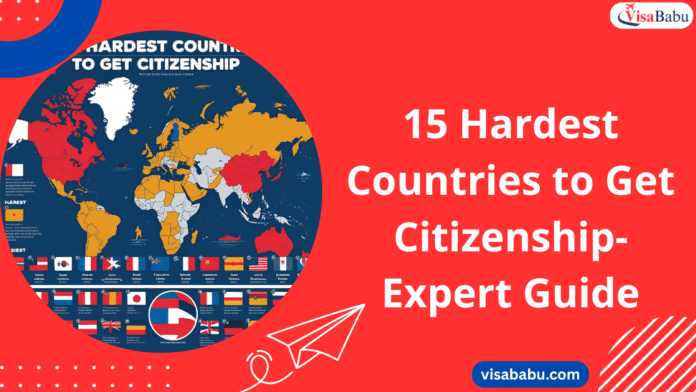Figuring out the hardest countries to get citizenship can feel like trying to solve a complex puzzle, with rules that seem designed to keep people out rather than welcome them in. The dream of a new life and that of a second passport is an illusion in the mind of many, but the fact is that some countries have erected barriers of bureaucracy and strict qualifications and it is almost like climbing a wall with no windows or gates.
This guide delves into the world’s toughest countries for citizenship, breaking down their famously difficult citizenship requirements. We will explore everything from the gruelling naturalisation process and severe dual citizenship restrictions to the steep residency requirements for citizenship. If you’ve ever been curious about why some nations are so exclusive or whether citizenship by investment can be a shortcut, you’re in the right place.
Getting to a new nationality is not usually easy; however, in this particular set of nations, it is an epic marathon of mammoth proportions. Understanding what makes these the hardest countries to get citizenship is the first step for anyone considering a global move.
List of Top 15 Hardest Countries to Get Citizenship in the World 2025
- Qatar
- Vatican City
- Liechtenstein
- Switzerland
- China
- North Korea
- Bhutan
- Saudi Arabia
- Kuwait
- Japan
- United Arab Emirates (UAE)
- Monaco
- Austria
- San Marino
- Finland
What Makes a Nation One of the Hardest Countries to Get Citizenship in 2025? Experts Insights
These barriers are not made accidentally by countries. The reasons behind making their homeland one of the hardest countries to get citizenship are often rooted in deep-seated cultural, economic, and political values.
- National identity conservation: Most countries, particularly those with distinct cultures such as Japan or Bhutan, formulate stringent regulations to guard their customs, language and social structure against quick evolution. This makes them some of the hardest countries to get citizenship in.
- Economic stability and exclusivity: Rich countries such as Qatar, Kuwait, and Switzerland prefer to keep their luxury lifestyle and social welfare limited to a select people. Controlling access to citizenship is a way to manage resources, making them some of the hardest countries to get citizenship.
- Immigration and Population Control: Countries that are small, such as Monaco, Liechtenstein and San Marin,o have no space to accommodate and can hardly sustain their resources. They also rely on citizenship laws to regulate the density of population so that it may not surpass their capabilities to handle it through their infrastructure. This approach solidifies their status among the hardest countries to get citizenship.
- Political and Security concerns: Countries such as China, North Korea, and Saudi Arabia have stringent security and political reasons. Their citizenship processes are opaque and often granted based on factors beyond typical residency or integration, placing them firmly on the list of the hardest countries to get citizenship.
- Commitment and Loyalty: The long and tedious process makes sure that hardcore and well-integrated people become citizens. This philosophy is why some of the hardest countries to get citizenship demand decades of residency and full cultural assimilation.
Latest Comparison of the World’s Toughest Citizenship Paths: Experts’ Insights & Guide 2025
This table provides a quick overview of why these nations are considered the hardest countries to get citizenship.
| Rank | Country | Minimum Residency | Language Test? | Allows Dual Citizenship? | Core Challenge(s) |
| 1 | Qatar | 25 years | Yes (Arabic) | No | Extreme residency, paternal bloodline, must renounce |
| 2 | Vatican City | By Appointment | Yes (Italian) | N/A | Not available through naturalisation; job-based only |
| 3 | Liechtenstein | 30 years | Yes (German) | Yes (limited) | Longest residency in Europe, community vote required |
| 4 | Switzerland | 10 years | Yes (National) | Yes | Complex cantonal rules, deep integration required |
| 5 | China | Varies | Yes (Chinese) | No | Primarily based on heritage, naturalisation is rare |
| 6 | North Korea | N/A | Yes (Korean) | No | Entirely discretionary; politically unobtainable for most |
| 7 | Bhutan | 20 years | Yes (Dzongkha) | No | Loyalty to the monarchy, long residency |
| 8 | Saudi Arabia | 10 years | Yes (Arabic) | No | Must be Muslim, government’s discretion |
| 9 | Kuwait | 20 years | Yes (Arabic) | No | Paternal bloodline, an extremely selective process |
| 10 | Japan | 5 years | Yes (Japanese) | No | Strict cultural assimilation, must renounce prior citizenship |
| 11 | UAE | 30 years | Yes (Arabic) | No (with new exceptions) | Extremely long residency, highly selective |
| 12 | Monaco | 10 years | Yes (French) | No | Personal approval from the Prince, must renounce |
| 13 | Austria | 10 years | Yes (German) | No (mostly) | Long residency, renunciation required, very high bar |
| 14 | San Marino | 30 years | Yes (Italian) | No | Second-longest residency requirement in Europe |
| 15 | Finland | 5 years | Yes (Finnish/Swedish) | Yes | Notoriously difficult language exam |
A Detailed Look into the Hardest Countries to Get Citizenship in 2025-26
To see where each of these countries takes its toughness to aspiring citizens, let us look at it. The path is different for each, but the outcome is the same: they are all among the hardest countries to get citizenship.
1. Qatar
Often topping the list of the hardest countries to get citizenship, Qatar’s laws are exceptionally strict. A legal resident in the country should live there for a shocking 25 years without stepping out for longer than six months. Mastering the Arabic language is a must. Furthermore, Qatar does not recognise dual citizenship restrictions, meaning you must renounce all previous nationalities. Citizenship is primarily passed down through paternal lineage (a Qatari father). Provided that you have all these conditions, there are only about 50 foreigners who are granted citizenship per year by the government. This privilege renders Qatar as the most likely country that is the most difficult to obtain citizenship.
| Requirement | Description |
| Residency | 25 consecutive years. |
| Language | Fluency in Arabic is mandatory. |
| Dual Citizenship | Strictly forbidden; must renounce all other nationalities. |
| Key Challenge | The extreme residency period combined with a highly selective, discretionary approval process that favours those with Qatari fathers. |
2. Vatican City
Vatican City is an anomaly. With a population of under 1,000, it doesn’t have a standard naturalisation process. You can not just migrate there and wait. There are citizenship rules according to which you are given citizenship depending on your work serving the Holy See. This covers Cardinals living in Rome, diplomatic and members of the Swiss Guard. It is dependent on your employment, and in most instances, it is nullified when your service term expires. Because there is no path for the average person, Vatican City is one of the hardest countries to get citizenship by default.
| Requirement | Description |
| Residency | Not applicable; citizenship is based on appointment. |
| Language | Italian and Latin are the official languages. |
| Dual Citizenship | Not applicable in the traditional sense; citizenship is temporary. |
| Key Challenge | Citizenship cannot be obtained through naturalisation; it is exclusively granted to individuals serving the Holy See. |
3. Liechtenstein
The microstate of Liechtenstein is engulfed in the middle of Austria and Switzerland, offering one of the most daunting European citizenship dilemmas. The ordinary route takes 30 years of residency. The last step is the most unusual and challenging to overcome, as you have to be voted in by your local community to be a citizen. In the event that they deny your application then you are screwed. This combination of extreme residency and community approval solidifies its place among the hardest countries to get citizenship.
| Requirement | Description |
| Residency | 30 years (can be reduced via marriage or community vote). |
| Language | Proficiency in German is required. |
| Dual Citizenship | Permitted, but subject to specific conditions. |
| Key Challenge | The 30-year wait is the longest in Europe, and the application’s success depends on a vote by the local community. |
4. Switzerland
Switzerland’s reputation as one of the hardest countries to get citizenship is well-earned. As much as the federal residency requirement is 10 years, the main difficulty is in the levels of approval. You should be an active partner in your community. Applicants must demonstrate proficiency in one of the national languages (German, French, or Italian). Your application is evaluated at three levels: federal, cantonal (state), and communal (local). Any level of failure implies denial.
| Requirement | Description |
| Residency | 10 years, including several years in the same canton/commune. |
| Language | B2 level (speaking) and A2 level (writing) in a national language. |
| Dual Citizenship | Permitted without restriction. |
| Key Challenge | Passing the rigorous, multi-layered approval process at the local, cantonal, and federal levels, which scrutinises social integration. |
5. China
The citizenship laws of China are also the most restrictive in the world. The nation does not accept dual citizenship. Naturalisation is permissible at law, but in practice, it is only done in cases of people of Chinese origin or those who have been able to provide extraordinary contributions to the country. For the average foreigner without ethnic ties, the path is virtually non-existent, making China one of the hardest countries to get citizenship.
| Requirement | Description |
| Residency | No set period; case-by-case basis, often requiring family ties. |
| Language | Proficiency in Chinese is expected. |
| Dual Citizenship | Strictly forbidden. Acquiring another citizenship means automatic loss of Chinese citizenship. |
| Key Challenge | Naturalisation is extremely rare and primarily reserved for those with Chinese heritage. There is no clear path for other foreigners. |
6. North Korea
As the most isolated nation on Earth, North Korea is predictably one of the hardest countries to get citizenship. Naturalisation does not have a clearly and distinctly defined legal structure. The Praesidium of the Supreme People’s Assembly arbitrarily grants citizenship, and the decisions are discretionary. In a practical sense, the outsider has no chances of becoming a citizen of North Korea unless he/she has contacts with a person in a high governmental position.
| Requirement | Description |
| Residency | No defined policy or pathway. |
| Language | Korean proficiency is assumed. |
| Dual Citizenship | Not permitted. |
| Key Challenge | The process is entirely opaque and political, making it unobtainable for virtually all foreigners. |
7. Bhutan
Bhutan is a Himalayan kingdom that puts emphasis on the retention of its unique culture. This philosophy is also applicable in its citizenship laws, which are very strict. You have to be a resident of Bhutan for 20 years to have even a chance to apply. You should not have been talking badly about the King or the country during this period. You need to demonstrate that you have been able to integrate into Bhutanese culture. This makes it one of the hardest countries to get citizenship.
| Requirement | Description |
| Residency | 20 years for non-ethnic Bhutanese. |
| Language | Proficiency in Dzongkha is required. |
| Dual Citizenship | Not permitted. |
| Key Challenge | Proving unwavering loyalty to the monarchy and full cultural assimilation over two decades. |
8. Saudi Arabia
Saudi Arabia is another of the hardest countries to get citizenship, with a process steeped in religious and cultural requirements. The applicant must have legal residence of a minimum of 10 years, have the ability to speak the Arabic language, and have a clear criminal record. More importantly, candidates have to be Muslims. Dual citizenship is not allowed in the country. In spite of matching these prerequisites, the government has the last word.
| Requirement | Description |
| Residency | 10 years. |
| Language | Fluency in Arabic is required. |
| Religion | Applicants must be practising Muslims. |
| Key Challenge | The religious requirement and the discretionary nature of the final approval from the government. |
9. Kuwait
Similar to its neighbour Qatar, Kuwait has some of the world’s most difficult citizenship requirements. The normal life expectancy is 20 years for non-Arab foreigners. The children of Kuwaiti fathers are normally given citizenship. A foreign woman who gets married to a Kuwaiti citizen can make an application after 15 years of marriage. Naturalising as a foreigner without marital ties is exceptionally rare, ensuring Kuwait remains one of the hardest countries to get citizenship.
| Requirement | Description |
| Residency | 20 years (15 for other Arabs). |
| Language | Fluency in Arabic is mandatory. |
| Dual Citizenship | Not permitted. |
| Key Challenge | The process heavily favours those with Kuwaiti fathers, and the approval rate for other foreigners is extremely low. |
10. Japan
It takes five years of residency in Japan, and this appears to be rational. However, the country’s integration requirements are what make it one of the hardest countries to get citizenship. Candidates have to prove that they are fluent in Japanese, and the Ministry of Justice will conduct an in-depth research. Japan does not allow dual citizenship, and in that regard, you have to formally give up your former nationality. The focus on cultural assimilation makes Japan one of the toughest countries for citizenship.
| Requirement | Description |
| Residency | 5 years of continuous residence. |
| Language | Conversational to fluent Japanese is required. |
| Dual Citizenship | Strictly forbidden; must renounce prior citizenship. |
| Key Challenge | The strict renunciation requirement and the subjective assessment of an applicant’s assimilation into Japanese society. |
11. United Arab Emirates (UAE)
The UAE is a land of expatriates, but it is a different thing to become a citizen. The normal residency is 30 years. Although the rules are slightly relaxed to include some investors and professionals through invitation to the country and to receive citizenship, it is not an open application process. For the vast majority, the 30-year wait and selective process make the UAE one of the hardest countries to get citizenship.
| Requirement | Description |
| Residency | 30 years for most foreigners. |
| Language | Arabic proficiency is required. |
| Dual Citizenship | Not generally permitted, with recent exceptions for highly skilled individuals by invitation only. |
| Key Challenge | The extremely long residency period and the fact that naturalisation is typically by invitation rather than application. |
12. Monaco
This glamorous principality is one of the hardest countries to get citizenship due to its exclusivity. A candidate should have more than 10 years of living in Monaco. Once this time passes, you will be able to apply, but the decision is still ultimately made by the sovereign, the Prince of Monaco, and is completely discretionary. In case of your approval, you will have to renounce all other citizenships.
| Requirement | Description |
| Residency | 10 years. |
| Language | Proficiency in French is expected. |
| Dual Citizenship | Not permitted; renunciation is mandatory. |
| Key Challenge | Citizenship is granted at the personal discretion of the Prince of Monaco, with no guarantee of success. |
13. Austria
Austria is an EU member that may be easy to access, but it is one of the countries in the region that has the most difficult naturalisation procedure. It needs 10 consecutive years of residence and knowledge of German. Austria has strict dual citizenship restrictions. A path for citizenship by investment exists but requires an “extraordinary contribution” and is granted very rarely. These factors make Austria one of the hardest countries to get citizenship in Europe.
| Requirement | Description |
| Residency | 10 years. |
| Language | B2 level German proficiency. |
| Dual Citizenship | Generally not permitted; requires renunciation of prior citizenship. |
| Key Challenge | The combination of a long residency period, difficult language requirements, and a strict prohibition on dual citizenship. |
14. San Marino
The ancient republic of San Marino has one of Europe’s most daunting residency requirements for citizenship. You are required to legally live in the country to the age of a full 30 years before you attain the status of a naturalised citizen. It is one of the longest residency policies in the world. The country also does not permit dual citizenship, making it undeniably one of the hardest countries to get citizenship.
| Requirement | Description |
| Residency | 30 years. |
| Language | Proficiency in Italian is required. |
| Dual Citizenship | Not permitted. |
| Key Challenge | The 30-year residency requirement is one of the longest in the world, demanding lifelong commitment before application. |
15. Finland
The five-year residency requirement of Finland is typical of the EU. The real obstacle is the language. The candidates have to take a merciless language test, either Swedish or Finnish. Finnish belongs to the Finno-Ugric language family; therefore, it is very challenging to learn it by the majority of foreigners. This language barrier is so significant that it places Finland on the list of the toughest countries for citizenship.
| Requirement | Description |
| Residency | 5 years. |
| Language | Must pass an intermediate to advanced level language test in Finnish or Swedish. |
| Dual Citizenship | Permitted. |
| Key Challenge | The Finnish language is notoriously difficult to master, and passing the required exam is a major obstacle for most applicants. |
The process of naturalisation implies the undertaking of the extensive language tests, which not only assess the proficiency of the communication but also the knowledge and assimilation of the culture. A large number of long-term residents are not able to cope with these requirements, even though they do qualify in all the other aspects.
Dual Citizenship Restrictions in the Toughest Countries to Get Citizenship in 2025
Gaining citizenship in certain countries can be a complex process, especially when dual citizenship restrictions come into play. The table below provides an outline of some of the most difficult nations to acquire citizenship in 2025, and the exact policies of their approach to dual citizenship.
| Country | Dual Citizenship Allowed? | Enforcement Level | Exceptions Available? | Impact on Applications |
| Qatar | No | Strict | None | Major barrier |
| China | No | Automatic loss | Very rare | Complete prohibition |
| Saudi Arabia | No | Strict | None | Religious requirement |
| Kuwait | No | Strict | None | Major barrier |
| Japan | No | Strict | None | Must renounce |
| North Korea | No | Unknown | Unknown | Political control |
| Switzerland | Yes | Moderate | Standard process | Permitted |
| Liechtenstein | Yes (limited) | Moderate | Local approval | Restricted |
| Austria | No (rare exceptions) | Strict | Very limited | Major barrier |
| UAE | No | Strict | None | Must renounce |
| Monaco | No | Strict | None | Must renounce |
| San Marino | No | Strict | None | Not recognized |
| Finland | Yes | Moderate | Standard process | Permitted |
| Bhutan | No | Strict | None | Loyalty requirement |
| Vatican City | N/A | N/A | N/A | Special circumstances |
Hardest Countries to Get Citizenship: Naturalisation Process Complexity in 2025
Acquisition of citizenship in some countries is a complex process, which usually entails rigorous requirements, long procedures, and time-consuming. The table below shows the most difficult countries to acquire citizenship in 2025 in terms of the difficulty of the naturalisation procedures.
| Country | Application Stages | Local Approval Required | Interview Process | Background Check Depth | Processing Time |
| Qatar | Multiple | Yes | Extensive | Comprehensive | 2-5 years |
| Switzerland | Multiple | Yes (cantonal/local) | Extensive | Comprehensive | 1-3 years |
| China | Multiple | Yes | Extensive | Comprehensive | 3-7 years |
| Japan | Multiple | Yes | Standard | Comprehensive | 6-12 months |
| Kuwait | Multiple | Yes | Extensive | Comprehensive | 2-4 years |
| Saudi Arabia | Multiple | Yes | Extensive | Comprehensive | 3-5 years |
| Liechtenstein | Multiple | Yes (community) | Extensive | Comprehensive | 2-4 years |
| Austria | Multiple | Yes | Standard | Comprehensive | 1-2 years |
| UAE | Multiple | Yes | Standard | Comprehensive | 2-3 years |
| Finland | Standard | No | Language test | Standard | 6-18 months |
Understanding the Hardest Countries to Get Citizenship by Investment in Difficult Countries 2025
Citizenship by investment programs are notably absent from most of the hardest countries to get citizenship. This shortage represents the priorities of these countries of maintaining culture and selective immigration instead of economic motives.
Austria’s Exceptional Investment Path
Austria offers one of the few citizenship by investment options among the hardest countries to get citizenship, but it’s extremely selective. Investments are generally between 800000 and 10 million euros, and they must be approved by showing that there is an outstanding benefit to Austria.
The Austrian scheme does not guarantee citizenship and requires a lot of due diligence. Applicants must still meet integration requirements and pass background checks, making it one of the most challenging citizenship by investment programs globally.
UAE’s Limited Investment Options
The UAE has recently introduced limited citizenship by investment opportunities for select investors and professionals. However, these programs remain highly restrictive and don’t significantly change the UAE’s status among the hardest countries to get citizenship.
Why Most Difficult Countries Avoid Investment Programs
The hardest countries to get citizenship typically avoid citizenship by investment programs because they prioritise cultural integration over economic contribution. These countries feel that citizenship must not be based on monetary investments, but it must be a lasting dedication of its people and cultural assimilation.
Hardest Countries to Get Citizenship: Language Requirements and Proficiency Levels in 2025
The process of citizenship acquisition in some countries is not easy, and it often requires the applicant to be able to pass their language proficiency tests at a high level. The following table represents the most difficult countries to acquire citizenship, including requirements of language requirements and the level of proficiency in 2025.
| Country | Required Language | Proficiency Level | Testing Method | Cultural Component | Pass Rate |
| Qatar | Arabic | Advanced | Government test | Extensive | <20% |
| Switzerland | National language | B2/A2 | Cantonal test | Moderate | 60-80% |
| Japan | Japanese | Advanced | Government test | Extensive | 40-60% |
| Finland | Finnish/Swedish | Intermediate | YKI test | Moderate | 30-50% |
| Saudi Arabia | Arabic | Advanced | Government test | Extensive | <30% |
| Kuwait | Arabic | Advanced | Government test | Extensive | <25% |
| Liechtenstein | German | Advanced | Local test | Extensive | 50-70% |
| Austria | German | B2 | ÖSD/ÖIF test | Moderate | 70-85% |
| China | Chinese | Advanced | HSK test | Extensive | <40% |
| Bhutan | Dzongkha | Intermediate | Government test | Extensive | <50% |
The Economic Impact of Restrictive Citizenship Policies in 2025
The hardest countries to get citizenship often maintain their restrictive policies due to economic considerations that go beyond simple population control.
Labour Market Protection
Many of the hardest countries to get citizenship use restrictive policies to protect employment opportunities for existing citizens. Through such restriction of citizenship, they are able to exert control over their labour markets, thus avoiding wage depression.
Social Service Sustainability
Socially advanced countries tend to limit citizenship so that their social benefits can be sustained. The hardest countries to get citizenship in frequently offer extensive healthcare, education, and welfare benefits that require careful population management.
Property and Investment Markets
Some nations among the hardest countries to get citizenship restrict naturalisation to control property markets and prevent foreign speculation. This is more so applicable in small but rich nations where the citizens have the right to own property.
Tax and Financial Implications
The hardest countries to get citizenship often have complex tax systems that provide significant benefits to citizens. Limiting citizenship aids in maintaining the amount of taxation and in avoiding the abuse of the system.
Success Rates and Application Statistics to Get Citizenship in the Toughest Countries in the World 2025
The acquisition of citizenship in some of the most demanding nations in the world is going through thick and thin to get through the thick forest of requirements and cut-throat procedures of application. Success rates and other important statistics in the application are broken down in the table below so that one has a clear picture of what is required to acquire citizenship in these countries by the year 2025.
| Country | Annual Applications | Approval Rate | Average Processing Time | Most Common Rejection Reason |
| Qatar | 50-100 | <5% | 3-5 years | Integration requirements |
| Switzerland | 30,000-40,000 | 85-90% | 18-36 months | Language proficiency |
| Japan | 10,000-15,000 | 95% | 6-12 months | Financial stability |
| Austria | 8,000-10,000 | 70-80% | 12-24 months | Language requirements |
| Finland | 6,000-8,000 | 60-70% | 12-18 months | Language test failure |
| Kuwait | 20-50 | <10% | 2-4 years | Residency verification |
| Saudi Arabia | 100-200 | <15% | 3-5 years | Religious requirements |
| China | 1,000-2,000 | <20% | 3-7 years | Heritage documentation |
| UAE | 200-500 | <25% | 2-3 years | Residency requirements |
| Liechtenstein | 10-20 | 60-70% | 2-4 years | Community approval |
Latest Alternative Strategies to Get Citizenship for the Hardest Countries in the World 2025
For those determined to pursue citizenship in the hardest countries to get citizenship, several strategies can improve success chances while acknowledging the significant challenges involved.
Early Integration and Language Learning
Starting language learning and cultural integration immediately upon arrival can significantly improve chances in the hardest countries to get citizenship. The long-term process shows dedication and assists in the achievement of stringent integration demands.
Professional and Educational Pathways
Some of the hardest countries to get citizenship in offer slightly easier paths for individuals with specific professional skills or educational backgrounds. Early research on such opportunities can be very strategic.
Family and Marriage Considerations
While marriage doesn’t guarantee citizenship in the hardest countries to get citizenship, it can provide alternative pathways or reduced requirements in some cases. Nevertheless, such relationships have to be true and long-lasting.
Community Involvement and Networking
In those countries where local approval is needed, e.g. Liechtenstein or Switzerland, local activity may play an important role in the success of the application. Such integration is illustrated by establishing real relations and providing value to the surrounding community.
Legal and Professional Assistance
Given the complexity of procedures in the hardest countries to get citizenship, professional legal assistance is often essential. Lawyers who deal with these countries on immigration learn these details that could either seal an application or not.
Latest Future Trends in Citizenship Policies Worldwide 2025
The landscape of the hardest countries to get citizenship continues to evolve as global migration patterns change and countries adapt their policies to new realities.
Technology and Verification
Advanced technology is making background checks and verification processes more thorough in the hardest countries to get citizenship. The trend has the potential of complicating applications, but at the same time, making them more open.
Climate and Demographic Pressures
Some of the hardest countries to get citizenship may face pressure to adjust policies due to ageing populations or climate-related migration needs. Nevertheless, the change will most probably be gradual and well-controlled.
Economic Competition
As global competition for talent increases, even some of the hardest countries to get citizenship may need to balance restrictive policies with economic needs for skilled workers.
International Relations Impact
Geopolitical changes can affect citizenship policies in the hardest countries to get citizenship, particularly regarding specific nationalities or regions.
Conclusion
The hardest countries to get citizenship represent some of the world’s most exclusive and challenging naturalisation processes. The 25-year term of stay in Qatar and the appointment-only policy of Vatican City are just some of the countries that have kept these barriers to the point where they almost make citizenship ineligible to most nationalities. Understanding the difficult citizenship requirements, dual citizenship restrictions, and complex naturalisation processes in these countries is essential for anyone considering long-term international relocation.
While the hardest countries to get citizenship may seem impossible to navigate, some individuals do succeed through careful planning, long-term commitment, and meeting every requirement. Though to the vast majority of individuals who want to gain international mobility, it is more feasible and reasonable to consider those countries that have a more open citizenship process.
The hardest countries to get citizenship will likely remain exclusive, as their restrictive policies serve specific national interests and cultural preservation goals. It is yet to be seen whether these policies will be able to change with the times and circumstances of the world; however, at present, they constitute the final test of international citizenship acquisition.
Are you willing to pursue your opportunities, or do you have visa problems and residency issues? Visit VisaBabu for expert guidance on global mobility, citizenship, and more!
Frequently Asked Questions (FAQs)
Q1. What makes Qatar one of the hardest countries to get citizenship?
Ans. The duration of residence within Qatar, fluency in Arabic, total cultural integration, and the rejection of prior citizenship is 25 years. The process to get it approved is very selective, and less than 5 per cent of applications pass.
Q2. In the most difficult countries, is it possible to obtain citizenship by investment?
Ans. Most of the hardest countries to get citizenship don’t offer citizenship by investment programs. Austria has a small scheme of minimum investment of 800,000-10 million euros, whereas the UAE has highly selective opportunities for a few investors.
Q3. Why don’t the most difficult countries accept dual citizenship?
Ans. The hardest countries to get citizenship often prohibit dual citizenship to ensure complete loyalty and prevent conflicts of interest. Nations such as Qatar, China, and Japan demand renunciation of the former nationality as a sign of dedication.
Q4. What is the longest term of residence to become a citizen of a country?
Ans. Liechtenstein and San Marino both require 30 years of residency, making them tied for the longest residency requirements among the hardest countries to get citizenship.
Q5. What kind of language requirements are in these nations?
Ans. Language requirements in the hardest countries to get citizenship are typically very demanding. The pass rate of the language test in Finland is 30-50 per cent of the test takers, and the pass rate in Arabic language requirements in the Gulf countries can be lower than 25 per cent.
Q6. Are the strict rules in the hardest countries an exception?
Ans. Very few exceptions exist in the hardest countries to get citizenship. There can be some exceptional cases when the marriage is with a citizen, contribution to the country is extraordinary, or there are some very particular skills that are needed, but such cases are very rare.





















